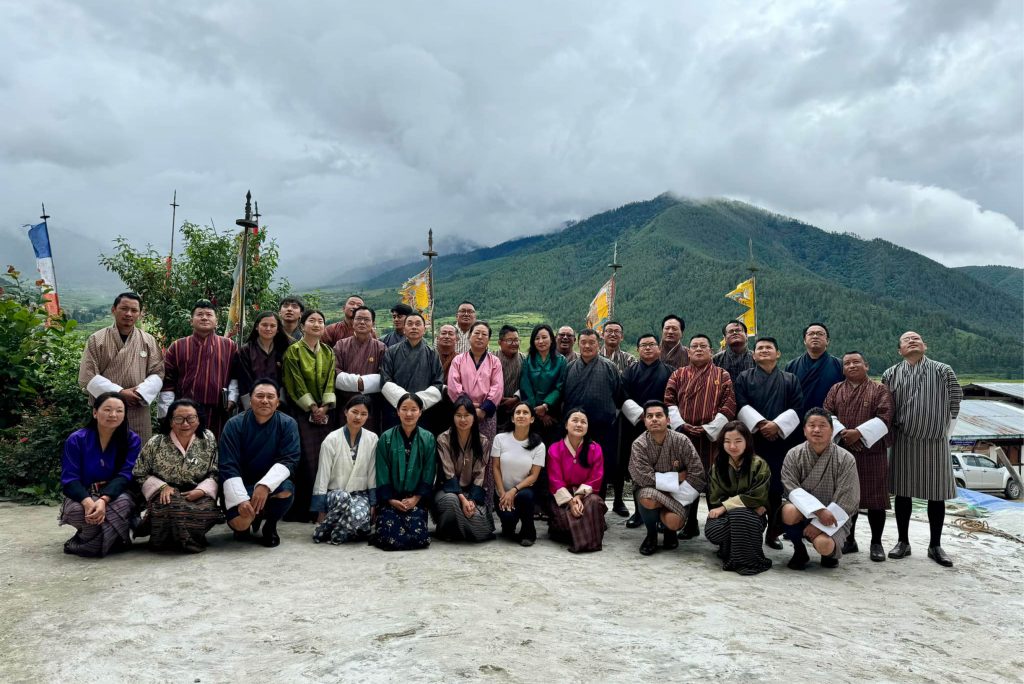RSPN Bhutan coordinated a two-day consultation workshop to strengthen further and innovate the #NatureClub activities in the schools. The workshop currently happening at Phobjekha is attended by diverse participants, school principals and teachers, District Education Officers, Curriculum Developers, Environmental Officers, college students, and experts in Environmental Education.
This consultation delves into strengthening further the RSPN’s role in promoting Environmental Education (EE) in Bhutan. The two-day consultation has the following specific objectives:
𝗨𝗻𝗱𝗲𝗿𝘀𝘁𝗮𝗻𝗱 𝘁𝗵𝗲 𝗥𝗼𝗹𝗲 𝗼𝗳 𝗡𝗮𝘁𝘂𝗿𝗲 𝗖𝗹𝘂𝗯 𝗶𝗻 𝗘𝗻𝘃𝗶𝗿𝗼𝗻𝗺𝗲𝗻𝘁𝗮𝗹 𝗘𝗱𝘂𝗰𝗮𝘁𝗶𝗼𝗻: Gain a comprehensive understanding of how Nature Clubs contribute to environmental education, including their activities, impact on awareness, and engagement strategies.
𝗗𝗲𝘃𝗲𝗹𝗼𝗽 𝗜𝗻𝗻𝗼𝘃𝗮𝘁𝗶𝘃𝗲 𝗦𝘁𝗿𝗮𝘁𝗲𝗴𝗶𝗲𝘀 𝗳𝗼𝗿 𝗦𝘂𝘀𝘁𝗮𝗶𝗻𝗮𝗯𝗶𝗹𝗶𝘁𝘆 𝗼𝗳 𝗡𝗮𝘁𝘂𝗿𝗲 𝗖𝗹𝘂𝗯: Generate and propose creative ideas and strategies to ensure the long-term sustainability of Nature Clubs and their environmental education initiatives. This includes exploring funding sources, community engagement, and resource management.
𝗔𝗰𝘁𝘂𝗮𝗹𝗶𝘀𝗲 𝘀𝗸𝗶𝗹𝗹𝘀 𝗮𝗻𝗱 𝗸𝗻𝗼𝘄𝗹𝗲𝗱𝗴𝗲 𝗳𝗼𝗿 𝗲𝗻𝗵𝗮𝗻𝗰𝗶𝗻𝗴 𝗡𝗮𝘁𝘂𝗿𝗲 𝗖𝗹𝘂𝗯: Develop proficiency in resource mobilization from various stakeholders, including understanding the components of a strong proposal, tailoring it to different audiences, and highlighting the unique value of Nature Clubs.
Similar to every nation in the world, Bhutan is grappling with many environmental issues and is also subject to unknown and unquantified ecological impacts in the future. From the recent report on Peoples’ Climate Vote, shared by UNDP-Bhutan, about 94% of the Bhutanese respondents expressed their concern about the impact of climate change on future generations. These environmental problems will have associated impacts across the sectors that reduce Bhutan’s capacity and ability to achieve the desired development objectives. Further, the lack of knowledge of the environment and failure to consider nature-positive solutions will severely deteriorate our environment. The National Adaptation Plan for Bhutan Launched in the previous year(2023) has identified ‘Education and awareness’ as critical components in raising awareness about climate change and adaptation among the public. The strategy for this priority includes integration of climate change adaptation into education curriculum; enhancing the skills pool for climate change adaptation planning and research through targeted scholarships; conducting advocacy campaigns on climate change adaptation, preparedness, and early warning as part of the communication strategy. There is no better time than now to act as a collaborative approach among multistakeholders ensuring effective and successful management of Bhutan’s rich biodiversity, environmental integrity and cultural association with nature.
More concerning today is the observation of disconnection between children and the natural world. There is a pressing need to instill a sense of environmental stewardship and appreciation for nature among young people, and also ideate in innovating to tackle some of the global issues through Nature-positive Solutions. The need for adequate, effective, and integrated Environmental Education for students and communities is a critical mechanism to bridge the gap. Therefore, a Nature Club in school is one of the mechanisms to promote Environmental Education to the youth and cultivate the young minds with positive thoughts and actions towards nature.
𝗕𝗮𝗰𝗸𝗴𝗿𝗼𝘂𝗻𝗱 𝗮𝗯𝗼𝘂𝘁 𝗡𝗮𝘁𝘂𝗿𝗲 𝗖𝗹𝘂𝗯𝘀:
RSPN has a long history of promoting Environmental Education in the country. In the ’90s, the primary focus of RSPN was on Environmental Education and created a network of Nature Clubs in schools to promote Environmental Education. These clubs provided the main opportunity for children to learn about nature, and to identify and address issues in their communities. RSPN supported the clubs financially and built the capacity of club in-charges and teachers through professional development courses and environmental camps.
Further, RSPN also worked with teacher training colleges to develop an Environmental Studies curriculum module. By 2008, RSPN has affiliated more than 100 schools across the country with Nature Clubs. Through these clubs, several environmental activities were initiated. In 2015, RSPN in collaboration of the erstwhile Ministry of Education also mainstreamed the Environmental Science subject into higher secondary school curriculum.

Copyright © 2026 RSPN All Rights Reserved